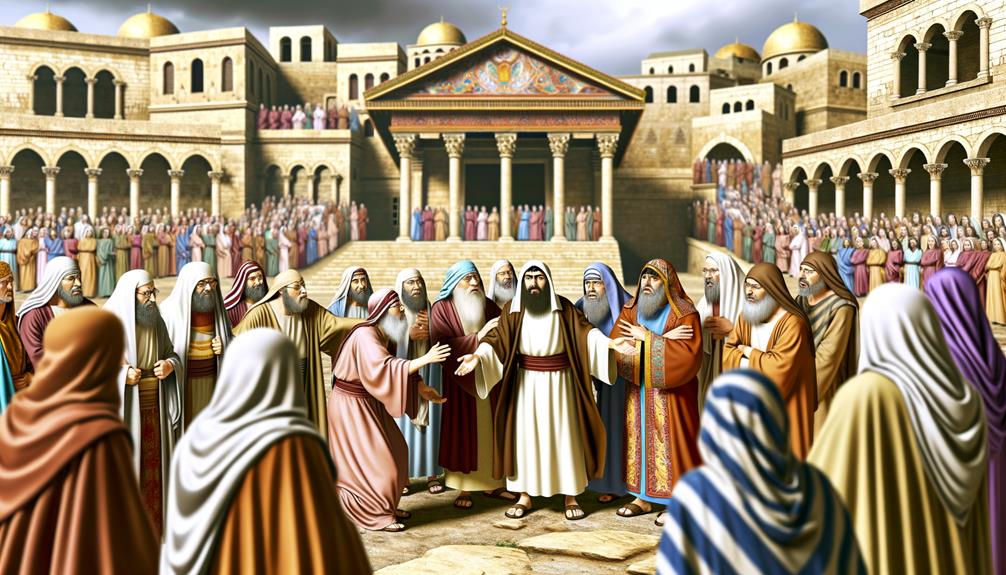Hostility Meaning in the Bible: Conflict and Redemption
Hostility in the Bible signifies various forms of conflict and enmity, ranging from personal vendettas like Cain and Abel’s (Genesis 4:1-16) to national struggles such as Israel’s battles (1 Samuel 17).
In the New Covenant, Jesus’ teachings on loving enemies (Matthew 5:43-48) and Paul’s emphasis on Christ’s unifying sacrifice (Ephesians 2:14-16) contrast with Old Covenant narratives, encouraging reconciliation and peace.
The theme extends to spiritual domains, urging believers to combat spiritual adversaries (Ephesians 6:12). These accounts provide profound theological insights into the nature of human conflict and divine justice, setting the stage for a deeper understanding.

Hostility Meaning in the Bible: Biblical View of Enmity and Conflict
| Aspect | Details |
|---|---|
| Biblical Term | Hostility / Enmity |
| Greek Root | Echthra (ἔχθρα) – meaning hatred, enmity (Galatians 5:20) |
| Biblical Usage | Refers to opposition between God and man, or between individuals |
| Key Verses | Romans 8:7, Ephesians 2:14-16, Galatians 5:20 |
| Source of Hostility | Result of sin, fleshly desires, and separation from God |
| God’s Solution | Through Christ, hostility is broken down (Ephesians 2:14) |
| Spiritual Insight | Emphasizes the call to reconciliation, peace, and love |
Hostility in the Old Testament

In the Old Scripture, hostility is often depicted through the narratives of enmity and conflict among individuals and nations, with significant theological implications and historical contexts.
For instance, the fraternal strife between Cain and Abel (Genesis 4:1-16) illustrates the destructive consequences of jealousy and sin.
The hostilities between Israel and surrounding nations, such as the Philistines (1 Samuel 17), highlight the constant struggle for survival and divine favor.
Additionally, the Israelites’ exodus from Egypt underscores God’s intervention in liberating His chosen people from oppression (Exodus 14).
These accounts not only reflect the pervasive nature of human discord but also serve as profound theological lessons about divine justice, covenant faithfulness, and the ultimate sovereignty of God over the affairs of humanity.
Hostility in the New Testament

The New Covenant addresses hostility through the teachings and actions of Jesus Christ, emphasizing reconciliation, love for enemies, and the breaking down of barriers between Jews and Gentiles (Matthew 5:43-48; Ephesians 2:14-16).
Jesus’ Sermon on the Mount instructs followers to love their enemies and pray for those who persecute them, contrasting with the Old Scripture’s “eye for an eye” principle.
Paul’s epistles further elucidate that Christ’s sacrifice dismantles the “dividing wall of hostility,” achieving peace and unity among believers (Ephesians 2:14-16).
Historically, this teaching was revolutionary, as it challenged deeply entrenched hostilities and social divisions.
Through these scriptural tenets, the New Scripture offers a transformative approach to overcoming hostility with divine love and reconciliation.
Cain and Abel

The narrative of Cain and Abel in Genesis 4:1-16 exemplifies the destructive nature of hostility, driven by Cain’s jealousy and rage over God’s favoring Abel’s sacrifice.
This divine preference underscores the importance of genuine devotion, yet it tragically results in the first fratricide, marking a profound consequence of unchecked aggression.
The story serves as a theological and historical witness to the devastating impact of envy and violence within human relationships.
Cain’s Jealousy and Rage
Exploring Cain’s jealousy and rage, the narrative of Cain and Abel in Genesis 4:1-16 offers a profound theological reflection on the origins of human hostility and its devastating consequences.
Cain, the firstborn of Adam and Eve, becomes consumed by jealousy when God favors Abel’s offering over his own. This intense feeling of inadequacy and envy culminates in an act of fratricide, marking the first murder recorded in Scripture.
God’s subsequent interrogation, ‘Where is Abel your brother?’ (Genesis 4:9), underscores the gravity of Cain’s sin and the severing of fraternal bonds.
This episode illustrates how unchecked negative emotions can lead to catastrophic actions, providing a cautionary tale about the destructive potential of human hostility.
Divine Favor and Sacrifices
In the narrative of Cain and Abel, divine favor is intricately linked to the nature and sincerity of their sacrifices, as illustrated in Genesis 4:3-5.
Abel, a shepherd, offers the firstborn of his flock, a gesture symbolizing wholehearted devotion and reverence. In contrast, Cain, a farmer, presents mere fruit of the ground, which lacks the same depth of sincerity.
Theological insight suggests that God’s favor upon Abel’s offering underscores the importance of genuine faith and intention in worship.
Historically, this episode highlights early biblical principles regarding acceptable offerings to God.
Scripturally, it serves as a foundational lesson on the criteria for divine approval, emphasizing that God values the heart and integrity behind the sacrifice over the mere act itself.
Consequences of Brother’s Murder
How did the act of Cain murdering Abel profoundly alter the course of biblical history and theology? This fratricide, documented in Genesis 4:8, marked the first instance of human bloodshed, embedding the concept of sin’s pervasive nature.
Theologically, it illustrated the destructive potential of unchecked jealousy and anger. Historically, Cain’s punishment—banishment and marking (Genesis 4:11-12, 15)—signified the divine justice system, emphasizing both retribution and mercy.
This event underscores the foundational biblical principle that sin disrupts human relationships and alienates individuals from God. Furthermore, it foreshadows the need for redemption and the eventual establishment of divine law.
Through Cain and Abel’s story, Scripture delineates the severe consequences of moral failure, shaping subsequent biblical narratives and theological doctrines.
Nations at War

In exploring ‘Nations at War‘, the Bible provides numerous examples of conflict, such as the battles between Israel and surrounding nations chronicled in the books of Joshua and Judges.
These narratives often illustrate the theme of divine justice in warfare, where victories and defeats are attributed to the Israelites’ faithfulness or disobedience to God’s commandments (Joshua 6:1-27, Judges 2:11-23).
Understanding these conflicts within their historical and theological context reveals deeper insights into the nature of divine sovereignty and human agency in the biblical worldview.
Biblical Examples of Conflict
The Bible presents numerous instances of nations clashing, such as the prolonged conflicts between Israel and its neighboring kingdoms, illustrating the pervasive nature of hostility throughout biblical history.
For example, the wars between Israel and the Philistines, depicted in 1 Samuel 17, showcase the intensity and frequency of these conflicts. Similarly, the Assyrian conquest of Israel in 2 Kings 17 highlights the devastating impact of national hostilities.
Theological insights reveal that these conflicts often stemmed from spiritual disobedience and were recorded to demonstrate the consequences of turning away from God.
These historical accounts serve as sobering reminders of the destructive nature of hostility and the importance of seeking divine guidance in national and personal conflicts.
Divine Justice in Warfare
Beyond documenting historical conflicts, the Bible frequently addresses the concept of divine justice in warfare, illustrating how God’s sovereignty and moral order influence the outcomes of nations at war. This theme is evident in several key instances:
- The Battle of Jericho (Joshua 6) – God’s intervention led to the city’s miraculous fall, underscoring His authority over military outcomes.
- King David’s Victories (2 Samuel 8) – David’s successes are depicted as manifestations of divine favor and justice.
- Babylonian Exile (2 Kings 25) – The fall of Jerusalem is presented as divine retribution for Israel’s disobedience.
These events emphasize that divine justice in warfare reflects a larger theological narrative where human actions and divine will intersect, demonstrating God’s omnipotence and moral governance in history.
Prophets and Persecution

Throughout biblical history, prophets frequently faced hostility and persecution for delivering God’s messages, a reality vividly illustrated in the experiences of figures like Jeremiah and Elijah.
Jeremiah was imprisoned and thrown into a cistern (Jeremiah 38:6), while Elijah fled for his life from Jezebel (1 Kings 19:2-3). This pattern of resistance underscores a theological tension between divine truth and human opposition.
| Prophet | Persecution Faced | Scriptural Reference |
|---|---|---|
| Jeremiah | Imprisonment, Cistern | Jeremiah 38:6 |
| Elijah | Fled from Jezebel | 1 Kings 19:2-3 |
| Micaiah | Imprisonment | 1 Kings 22:27 |
| Amos | Expelled from Bethel | Amos 7:12-13 |
These instances reflect the enduring struggle prophets endured to uphold God’s word amidst adversity.
Jesus and His Adversaries

Jesus encountered significant hostility from various groups, including the Pharisees, Sadducees, and Roman authorities, who perceived His teachings and actions as threats to their religious and political power. This animosity is documented throughout the Gospels, illustrating the tensions of His ministry.
- Pharisees: Jesus’ critique of their legalism (Matthew 23:27) deeply offended them, challenging their spiritual authority.
- Sadducees: His teachings on resurrection (Matthew 22:23-33) contradicted their beliefs, provoking their ire.
- Roman authorities: They viewed His claim to kingship (John 18:36-37) as a direct challenge to Caesar’s rule, leading to His crucifixion.
These encounters underpin the profound resistance Jesus faced, highlighting the broader conflict between divine truth and human power structures.
Spiritual Warfare

The concept of spiritual warfare in the Bible underscores the ongoing battle between the forces of good and evil, as epitomized by passages such as Ephesians 6:12, where believers are reminded that their struggle is not against flesh and blood but against spiritual forces of wickedness.
This theological insight reveals a historical context where the early Christians grappled with unseen adversaries, relying on scriptural references to fortify their faith and moral resolve.
| Scripture | Focus |
|---|---|
| Ephesians 6:12 | Spiritual Forces |
| 2 Corinthians 10:4 | Divine Power |
| James 4:7 | Resist the Devil |
| 1 Peter 5:8-9 | Be Vigilant |
| Romans 8:37 | More than Conquerors |
Engaging with these scriptures enriches the understanding of spiritual warfare, highlighting a divine strategy against hostility.
Reconciliation and Peace

Reconciliation and peace in the Bible reflect a divine initiative, where the fractured relationship between humanity and God is mended through Christ’s atoning sacrifice, as illustrated in passages like Colossians 1:20.
Historically, this reconciliation underscores God’s plan for unity, breaking the barriers of hostility. Scripturally, it embodies profound themes of forgiveness and renewal.
Consider the emotional impact:
- Restoration of Relationships: Ephesians 2:14-16 speaks of Christ abolishing enmity, creating peace.
- Healing of Nations: Isaiah 2:4 envisions a world where swords are turned into plowshares.
- Inner Tranquility: Philippians 4:7 promises peace that surpasses understanding, guarding hearts and minds.
In essence, reconciliation in the Bible is a transformative journey toward divine and communal peace.
Conclusion
In summation, the concept of hostility within biblical texts elucidates the perennial struggle between discord and harmony.
From the fratricidal strife of Cain and Abel to the adversarial encounters faced by Jesus, the scriptures offer a profound tapestry of conflict and resolution.
Through historical narratives and prophetic admonitions, the Bible underscores a divine call towards reconciliation and peace, urging humanity to transcend enmity.
Such theological insights invite a deeper understanding of the sacred interplay between spiritual warfare and divine grace.






